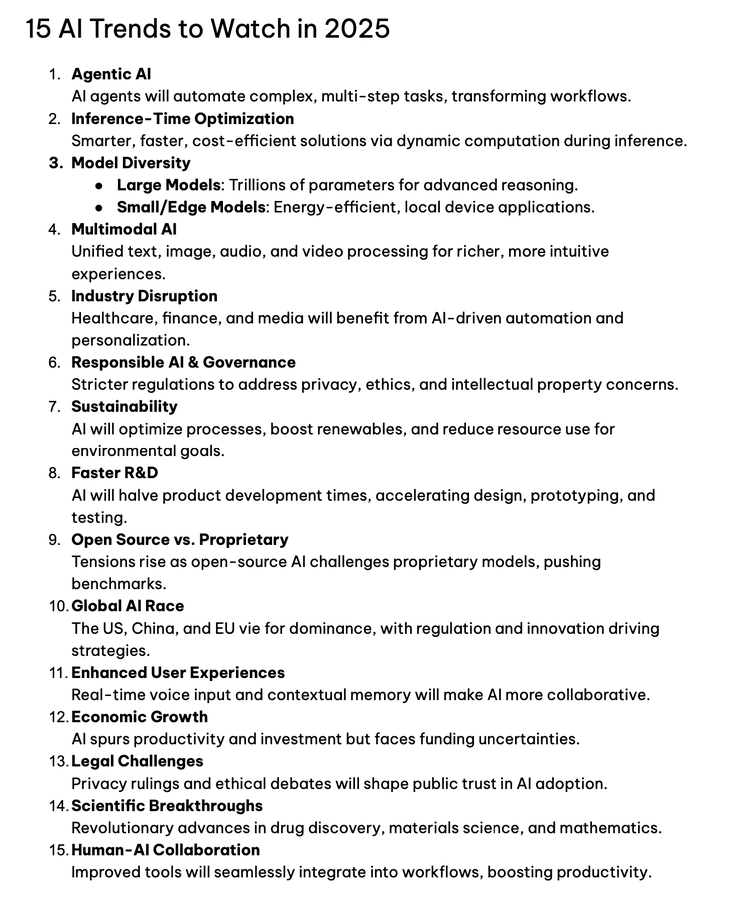Discover the top AI trends set to transform industries in 2025, from agentic AI revolutionizing workflows to multimodal AI enhancing user experiences. Explore how these advancements will drive productivity, innovation, and sustainability across various sectors.
Agentic AI: Transforming Workflows
Agentic AI is set to revolutionize the way businesses operate by automating complex, multi-step tasks. This advancement will significantly enhance productivity and efficiency in various industries. Companies like Nvidia, Google, Microsoft, and Salesforce are at the forefront of developing AI agents designed to carry out complex orders and instructions. AI agents will cut down unnecessary and excess human operations, leading to more streamlined workflows.
Inference-time Optimization
Inference-time optimization is another trend to watch out for in 2025. This technology aims to achieve smarter, faster, and more cost-efficient solutions through dynamic computation during inference. This will be particularly beneficial for industries that require real-time data processing and decision-making.
Model Diversity
The diversity in AI models will continue to grow, with large models utilizing trillions of parameters for advanced reasoning and small/edge models offering energy-efficient applications for local devices. This trend will cater to a wide range of applications, from high-powered data centers to low-power edge devices.
Multimodal AI
Multimodal AI, which unifies text, image, audio, and video processing, will provide richer and more intuitive experiences. This technology will be particularly useful in enhancing user interactions with AI, making them more natural and seamless.
Industry Disruption
AI-driven automation and personalization will disrupt various industries, including healthcare, finance, and media. In healthcare, AI will play a crucial role in drug discovery and personalized medicine. Also in finance, AI will enhance risk management and fraud detection. In media, AI will enable more personalized content recommendations and advertising.
Responsible AI & Governance
As AI continues to evolve, stricter regulations will be implemented to address privacy, ethics, and intellectual property concerns. The EU’s Digital Product Passport regulation is an example of such governance. Companies will need to ensure that their AI technologies comply with these regulations to maintain public trust.
Sustainability
AI will play a significant role in optimizing processes, boosting renewables, and reducing resource use for environmental goals. This will contribute to achieving sustainability and ESG (environmental, social, and governance) objectives.
Faster R&D
AI will halve product development times, accelerating design, prototyping, and testing. This will enable companies to bring new products to market more quickly and efficiently.
Open-source vs. Proprietary
The tension between open-source AI and proprietary models will continue to rise, pushing benchmarks and driving innovation. Open-source AI will challenge proprietary models, leading to more competitive and advanced AI solutions.
Global AI Race
The global AI race will intensify, with the US, China, and the EU vying for dominance. Regulation and innovation will drive strategies in this race, with each region aiming to lead in AI development and deployment.
Enhanced User Experiences
Real-time voice input and contextual memory will make AI more collaborative and user-friendly. This will enhance user experiences, making interactions with AI more intuitive and efficient.
Economic Growth
AI will spur productivity and investment, contributing to economic growth. However, funding uncertainties may pose challenges to sustained growth in the AI sector.
Legal Challenges
Privacy rulings and ethical debates will shape public trust in AI adoption. Companies will need to navigate these legal challenges to ensure the responsible use of AI technologies.
Scientific Breakthroughs
AI will drive revolutionary advances in drug discovery, materials science, and mathematics. These breakthroughs will have significant implications for various industries and scientific research.
Human-AI Collaboration
Enhanced tools will seamlessly integrate into workflows, boosting productivity. Human-AI collaboration will become more prevalent, with AI augmenting human capabilities and enabling more efficient operations.
Related Articles
- 120 mind-blowing AI tools by Kirk Borne
- 19 must-know AI tools that feel illegal to know
- 60 AI tools to start your profitable online business in 2025
- Leveraging AI for a sustainable and innovative workplace
- Top 5 AI skills for future


Looking for Travel Inspiration?
Explore Textify’s AI membership
Need a Chart? Explore the world’s largest Charts database
